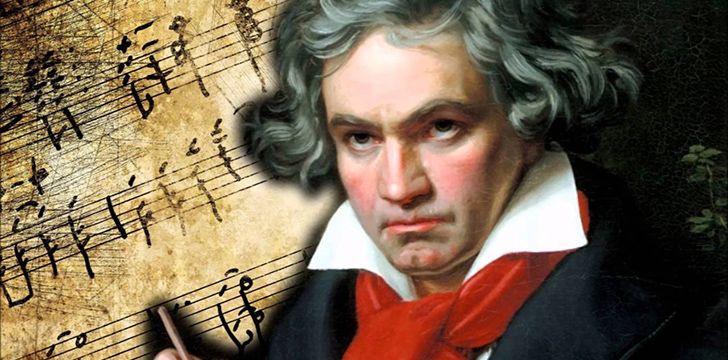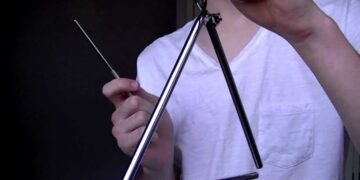Ludwig van Beethoven is arguably one of the most influential classical music composers of all time.
This German composer made his mark in the transitional period between the Classical and Romantic eras in classical music.
Even those who can’t name any of his works have heard his compositions somewhere in the world.
Take a look at these 42 facts about Ludwig van Beethoven – a renowned artist that you probably never knew much about!
Often considered one of the most influential music maestros, Ludwig van Beethoven was a true rock-star of the classical music world. Here’s a list of the top twenty facts about Beethoven.
Ludwig van Beethoven was born in Bonn, Germany, in December 1770. The actual date of his birth is unknown.
As a failed singer, Beethoven’s father pushed his own hopes on his son by forcing him to practice for hours on end every day. In fact, his father would often beat him when he played the wrong notes.
Beethoven had to leave school at age 11 to help support his family. Because of this, he never learned multiplication or division.
As a young boy Beethoven played the violin and often enjoyed musical improvisation rather than playing from a score. His father once said “I can’t bear that – scratch by note, otherwise your scratching won’t amount to much!”
Although Beethoven had 6 other siblings, four of them died during his lifetime.
Beethoven’s father was an alcoholic – a trait that Beethoven also eventually picked up.
By the time he was 18, Beethoven was the main supplier of income for his family.
As he was growing up, Beethoven’s father told him that he was born in 1772, not 1770. This was to give the illusion that his son was younger than he actually was, and therefore making his talents seem more remarkable. Beethoven himself didn’t find out the truth until years later.
Impressively, Beethoven published his first composition when he was 12. On top of that, it was written in C minor which was a strange choice for the time, and quite challenging to play.
After Mozart’s death in 1791, the Viennese Count Waldstein told the young Beethoven if he worked hard enough he would receive ‘Mozart’s spirit through Haydn’s hands’.
Beethoven kept a diary of his day-to-day goings on when living in Vienna from 1792, giving us insights into his daily life, from finding a new wig-maker to finding a place to buy a piano.
Sadly, Beethoven was prone to sickness and spent most of his life suffering from a vast variety of ailments such as colitis, rheumatism, rheumatic fever, typhus, skin disorders, abscesses, a series of infections, ophthalmia, inflammatory degeneration of the arteries, jaundice, chronic hepatitis, and cirrhosis of the liver.
When Beethoven moved to Vienna in his early 20’s, he took lessons from Joseph Haydn – another significant and influential composer.
Interestingly enough, the two lost patience with each other frequently, and subsequently didn’t like each other.
Around when Ludwig van Beethoven started composing music, the harpsichord was dominating. However, Beethoven focused on composing for the piano, at which point no one had written complete pieces for.
Unless his students were attractive women or overwhelmingly talented, Beethoven hated teaching piano lessons.
By 1793, at age 22, Beethoven often played the piano in the salons of the Viennese nobility and quickly established himself as a piano virtuoso, playing preludes and fugues from Bach’s Well Tempered Clavier.
Beethoven first performed his first symphony at the age of 30. Symphonies were considered light-hearted pieces of work but Beethoven’s introduction took things two steps further – so much further in fact that it is often considered a joke!
In 1802 during a retreat to Heiligenstadt outside of Vienna, a despairing Beethoven wrote “I would have ended my life – it was only my art that held me back. Ah, it seemed to me impossible to leave the world until I had brought forth all that I felt was within me.” This is now known as the Heiligenstadt Testament, and was published in 1828.
Beethoven’s early period is considered to have ended in 1802, after the Heiligenstadt Testament, and contains his first and second symphonies, a set of six string quartets, piano concerto no. 1 and 2, and around a dozen piano sonatas – including the ‘Pathétique’ sonata.
The infamous Moonlight Sonata was dedicated to Beethoven’s love interest and student, Julie Guicciardi.
Beethoven’s “heroic” middle period is heavily emotional and expresses heroes and struggles – this period includes Symphony No. 3, the last three piano concertos, five string quartets, Beethoven’s only opera, Fidelio, and piano sonatas including the “Moonlight,” “Waldstein” and “Appassionata.”
Beethoven’s late period – which included his works Symphony No. 9 with its choral finale, the Missa Solemnis, late string quartets, and some of his greatest piano music including sonatas and the Diabelli variations – is often considered to be jam-packed with musical genius and is characterized by its high intellectual intensity.
The “Moonlight” Sonata is one of Beethoven’s most famous works, yet was known only to him as Piano Sonata No. 14, and did not receive its nickname until 1832, 5 years after his death. German poet Ludwig Rellstab said the first movement sounded like moonlight shining upon Lake Lucerne, and the name stuck.
At the age of 25, Beethoven’s hearing started to decline. By 27, he heard constant buzzing, and by 46 he was entirely deaf.
Even after he gained notoriety, Beethoven always had to keep up his work to maintain a comfortable living situation.
A group of Viennese nobles grouped together to support Beethoven with an annual salary of 4,000 florins just to stay in Vienna for them as resident virtuoso and composer.
Beethoven was the first musician even to receive a salary just for composing whenever and whatever he wanted.
Before he lost his hearing, Beethoven was notorious for his improvising skills.
However, even after he lost his hearing, Ludwig van Beethoven retained perfect pitch and continued composing.
Beethoven’s Ninth Symphony was the first symphony ever composed that included parts for singers.
It is rumored that Beethoven would usually dip his head in cold water before composing, but nobody knows why.
An English piano builder, Thomas Broadwood, sent Beethoven a piano as a gift in 1818. However, by the time he got it, he was completely deaf and never heard a single note from it.
Beethoven was a large admirer of the French Revolution and Napoleon Bonaparte, dedicating his third symphony to him. When Napoleon declared himself Emperor Beethoven sprung into a wild rage, ripping the front page from his manuscript and scrubbing out Napoleon’s name.
After losing his hearing, Beethoven would communicate with his friends by having them write in “conversation books.”
Some of Beethoven’s most important works were composed in the last decade of his life, at which point he was entirely deaf.
Beethoven may have only composed one opera, but he reworked and revised the piece over a ten-year period giving us the two-act version performed today.
Beethoven’s music is widely used in film, and appears in some unexpected films, such as Saturday Night Fever where hints of his fifth symphony can be heard.
Beethoven was a man very partial to a tipple; in fact he was once arrested by an unsuspecting police officer for being a tramp! After his death his autopsy revealed a shrunken liver due to cirrhosis.
When he was composing, Beethoven would keep sketchbooks which have mostly survived – this helps us to understand a lot about how he composed!
When he was on his death bed, a friend brought Beethoven a few bottles of wine as a gift. Beethoven responded, “pity, pity, too late.” These were his last words.
The final piece Beethoven was able to finish was the final movement of the String Quartet No. 13, Opus 130, in 1825. He passed away on March 26, 1827.

















